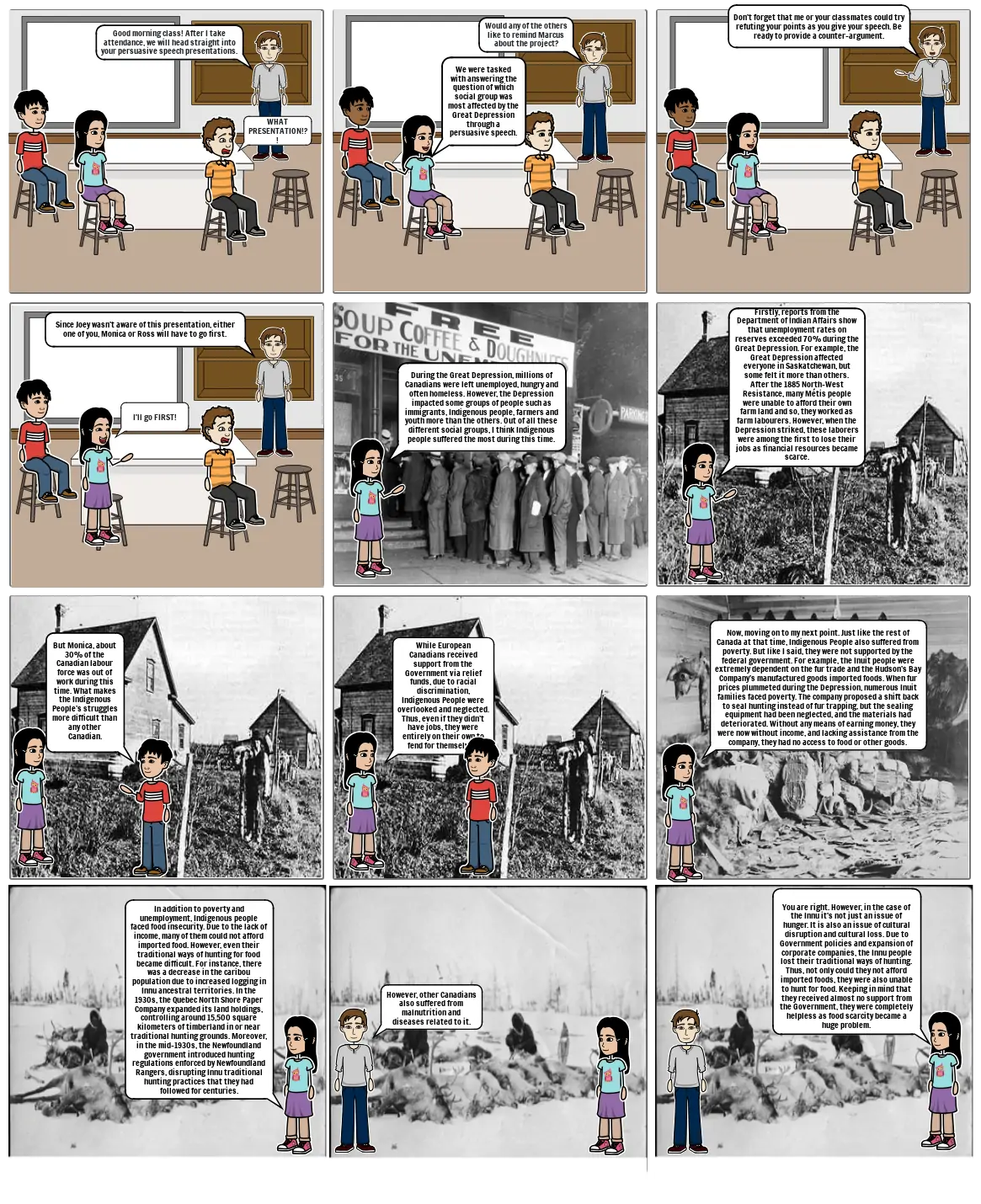His Unit 2

Siužetinės Linijos Tekstas
- Skaidrė: 1
- Good morning class! After I take attendance, we will head straight into your persuasive speech presentations.
- WHAT PRESENTATION!?!
- Skaidrė: 2
- Would any of the others like to remind Marcus about the project?
- We were tasked with answering the question of which social group was most affected by the Great Depression through a persuasive speech.
- Skaidrė: 3
- Don’t forget that me or your classmates could try refuting your points as you give your speech. Be ready to provide a counter-argument.
- Skaidrė: 4
- Since Joey wasn’t aware of this presentation, either one of you, Monica or Ross will have to go first.
- I'll go FIRST!
- Skaidrė: 5
- During the Great Depression, millions of Canadians were left unemployed, hungry and often homeless. However, the Depression impacted some groups of people such as immigrants, Indigenous people, farmers and youth more than the others. Out of all these different social groups, I think Indigenous people suffered the most during this time.
- Skaidrė: 6
- Firstly, reports from the Department of Indian Affairs show that unemployment rates on reserves exceeded 70% during the Great Depression. For example, the Great Depression affected everyone in Saskatchewan, but some felt it more than others. After the 1885 North-West Resistance, many Métis people were unable to afford their own farm land and so, they worked as farm labourers. However, when the Depression striked, these laborers were among the first to lose their jobs as financial resources became scarce.
- Skaidrė: 7
- But Monica, about 30% of the Canadian labour force was out of work during this time. What makes the Indigenous People’s struggles more difficult than any other Canadian.
- Skaidrė: 8
- While European Canadians received support from the Government via relief funds, due to racial discrimination, Indigenous People were overlooked and neglected. Thus, even if they didn’t have jobs, they were entirely on their own to fend for themselves.
- Skaidrė: 9
- Now, moving on to my next point. Just like the rest of Canada at that time, Indigenous People also suffered from poverty. But like I said, they were not supported by the federal government. For example, the Inuit people were extremely dependent on the fur trade and the Hudson’s Bay Company’s manufactured goods imported foods. When fur prices plummeted during the Depression, numerous Inuit families faced poverty. The company proposed a shift back to seal hunting instead of fur trapping, but the sealing equipment had been neglected, and the materials had deteriorated. Without any means of earning money, they were now without income, and lacking assistance from the company, they had no access to food or other goods.
- Skaidrė: 10
- In addition to poverty and unemployment, Indigenous people faced food insecurity. Due to the lack of income, many of them could not afford imported food. However, even their traditional ways of hunting for food became difficult. For instance, there was a decrease in the caribou population due to increased logging in Innu ancestral territories. In the 1930s, the Quebec North Shore Paper Company expanded its land holdings, controlling around 15,500 square kilometers of timberland in or near traditional hunting grounds. Moreover, in the mid-1930s, the Newfoundland government introduced hunting regulations enforced by Newfoundland Rangers, disrupting Innu traditional hunting practices that they had followed for centuries.
- Skaidrė: 11
- However, other Canadians also suffered from malnutrition and diseases related to it.
- Skaidrė: 12
- You are right. However, in the case of the Innu it's not just an issue of hunger. It is also an issue of cultural disruption and cultural loss. Due to Government policies and expansion of corporate companies, the Innu people lost their traditional ways of hunting. Thus, not only could they not afford imported foods, they were also unable to hunt for food. Keeping in mind that they received almost no support from the Government, they were completely helpless as food scarcity became a huge problem.
Sukurta daugiau nei 30 milijonų siužetinių lentelių

